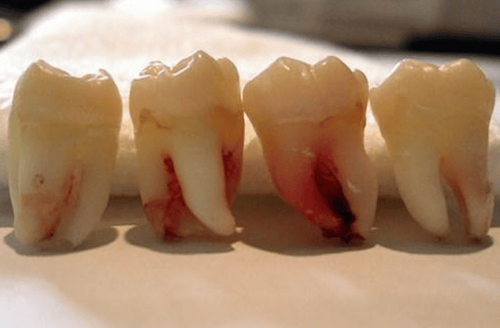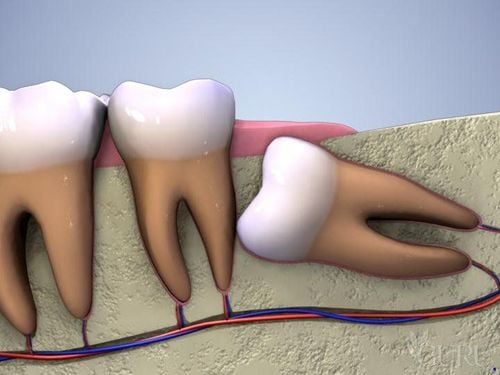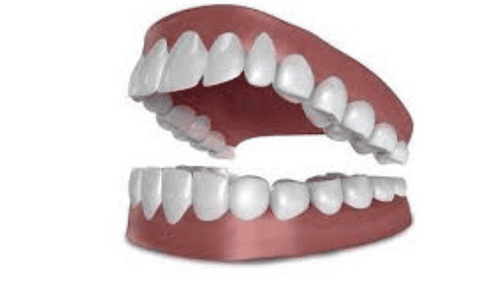This is an automatically translated article.
The article was professionally consulted by Doctor Department of Examination & Internal Medicine - Vinmec Hai Phong International General Hospital
In the case of a person with 32 teeth, there will be 4 wisdom teeth, but in reality many people may have only 2 wisdom teeth or no wisdom teeth at all. According to statistics, the rate of wisdom teeth in the lower jaw is more dangerously misaligned than the wisdom teeth in the upper jaw.
1. Which teeth are wisdom teeth?
Wisdom teeth (also known as number 8, third molars) are the last teeth to erupt in the jaw, usually appearing in people between the ages of 17 and 25. Wisdom teeth have caused various controversies due to their function. It's not obvious, but it's annoying. World dentistry still has not really agreed on whether to keep wisdom teeth or extract them.
During the several million years of human evolution that began with apes, the human jaw bone became smaller and smaller. Until now, most human jaws only have room for 28 teeth, 14 upper teeth and 14 lower teeth.
2. How many wisdom teeth does a person have?
In fact, we still have 32 teeth because 4 more wisdom teeth, 2 in the upper jaw and 2 in the lower jaw, they grow after 28 teeth. The problem occurs when they don't have enough room in the jaw to grow in the normal direction so they have to find another way to grow.
They can grow back toward the jawbone, straight into the second molar next to it, or they can grow normally, papillae can partially emerge from the gums, then become blocked and stop growing permanently.

3. Complications caused by wisdom teeth?
Misaligned wisdom teeth can cause many uncomfortable complications, affecting the patient's health:
Tooth decay Because wisdom teeth are located in the same jaw, it is difficult to clean food, so bacteria easily accumulate. The problem is especially difficult when the wisdom tooth has only partially erupted or has grown misaligned to penetrate the adjacent tooth. This long-term accumulation will cause tooth decay, causing pain and infection.
Gingivitis The accumulation of food and bacteria in the wisdom teeth will cause inflammation of the surrounding gums, leading to symptoms: pain, swelling, fever, bad breath or sometimes stiffness that makes the patient unable to open the mouth wide. . Gingivitis if it recurs many times until the wisdom tooth is treated, the more dangerous it is, the more dangerous it becomes.
Destruction of bones and teeth When a wisdom tooth grows crooked and pierces the next tooth, it will cause that tooth to be destroyed, shake the bone, and eventually lead to tooth extraction. The most obvious symptom is that the patient has a persistent dull pain in that area.
In some cases, if the abnormalities of wisdom teeth are not treated in time, the infection will spread to the surrounding areas of the ears, cheeks, eyes, neck... live.
4. Should wisdom teeth be extracted or left?

Many people are confused between removing wisdom teeth permanently or leaving them, doctors recommend removing wisdom teeth in the following cases: Wisdom teeth erupting causing painful complications, repeated infections, causing cysts and affecting the health of the body. neighboring teeth. Wisdom teeth have not caused complications, but there is a gap between the wisdom teeth and the adjacent teeth. In the future, it will soon affect the adjacent teeth, so it is necessary to remove the wisdom teeth to prevent complications. Wisdom teeth grow straight and full, unobstructed by gums and bones but do not have opposing teeth to fit, causing wisdom teeth to protrude into the opposite jaw, causing food stuffing and gingival ulcers on the opposite jaw. Wisdom teeth grow straight, full space, unobstructed but irregular shape, small, deformed, also cause food cramming with adjacent teeth, easy to cause tooth decay and periodontitis in the future. Wisdom teeth with periodontal disease or cavities. Extracting wisdom teeth when needing orthodontics, dentures, or wisdom teeth is the cause of a number of other systemic diseases.
For the following cases, it is not necessary to remove wisdom teeth:
Wisdom teeth grow straight, normal, without complications, not stuck by bone and gum tissue. Patients with poorly controlled systemic diseases such as diabetes, cardiovascular disease, blood clotting disorders... Wisdom teeth are directly related to important anatomical structures such as nerves, maxillary sinuses... It is not possible to perform specific surgical methods.
5. When should wisdom teeth be extracted?
Many people choose wisdom tooth extraction to completely solve the problem that wisdom teeth cause.
According to experts, the best time to extract wisdom teeth is between the ages of 18 and 25, when the roots have already formed 2/3. If you are over 35 years old, surgery to remove wisdom teeth will be more difficult because the bones are already hard and denser.
On the other hand, it is possible that some systemic and local factors do not allow intervention for wisdom tooth extraction. For the elderly, the process of wound healing and post-surgery is also prolonged, which is not favorable for surgery.
Please dial HOTLINE for more information or register for an appointment HERE. Download MyVinmec app to make appointments faster and to manage your bookings easily.













